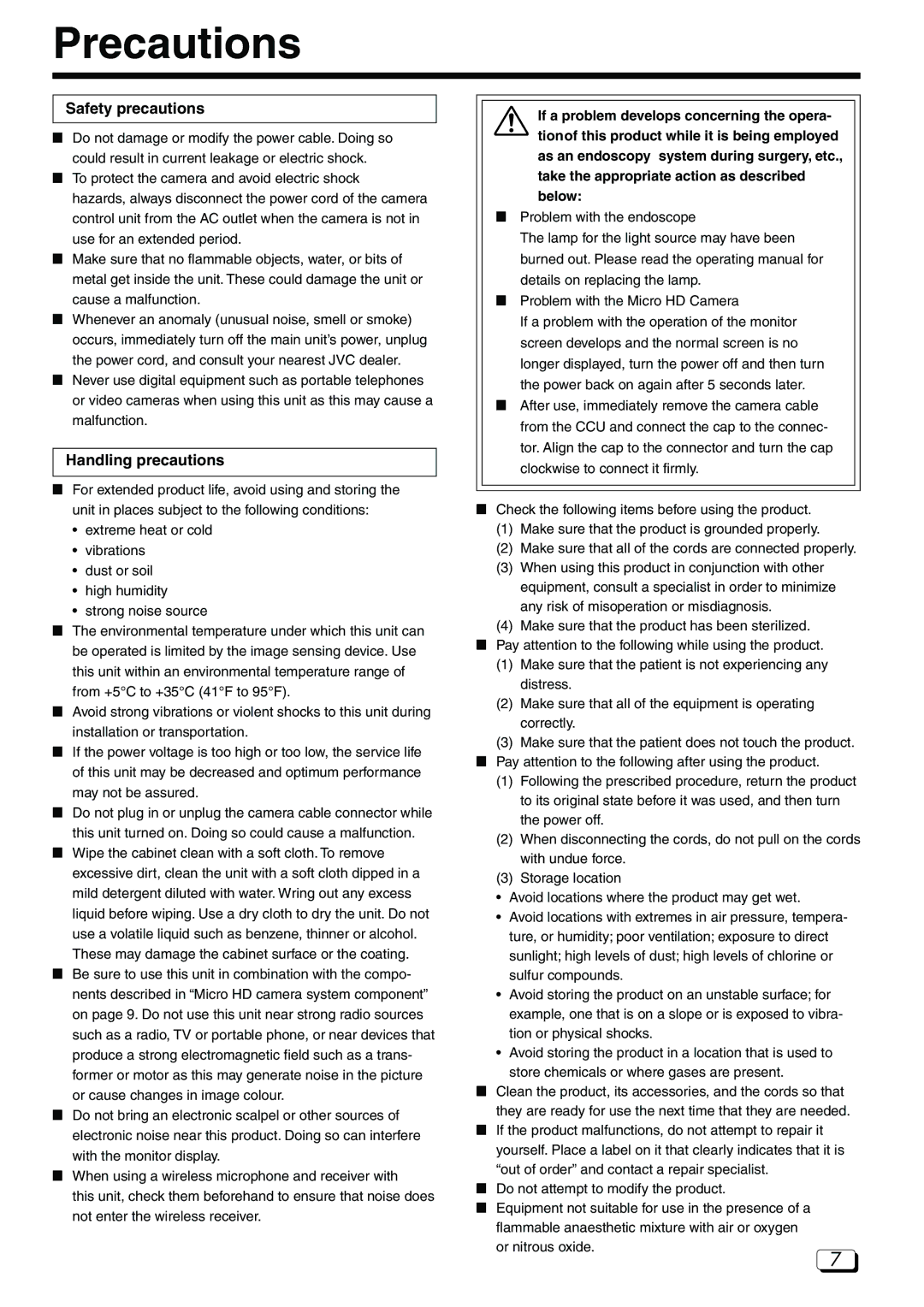
Precautions
Safety precautions
LDo not damage or modify the power cable. Doing so could result in current leakage or electric shock.
LTo protect the camera and avoid electric shock
hazards, always disconnect the power cord of the camera control unit from the AC outlet when the camera is not in
use for an extended period.
LMake sure that no flammable objects, water, or bits of metal get inside the unit. These could damage the unit or
cause a malfunction.
LWhenever an anomaly (unusual noise, smell or smoke) occurs, immediately turn off the main unit’s power, unplug
the power cord, and consult your nearest JVC dealer.
LNever use digital equipment such as portable telephones or video cameras when using this unit as this may cause a malfunction.
Handling precautions
LFor extended product life, avoid using and storing the unit in places subject to the following conditions:
•extreme heat or cold
•vibrations
•dust or soil
•high humidity
•strong noise source
LThe environmental temperature under which this unit can be operated is limited by the image sensing device. Use
this unit within an environmental temperature range of from +5°C to +35°C (41°F to 95°F).
LAvoid strong vibrations or violent shocks to this unit during
installation or transportation.
LIf the power voltage is too high or too low, the service life of this unit may be decreased and optimum performance
may not be assured.
LDo not plug in or unplug the camera cable connector while this unit turned on. Doing so could cause a malfunction.
LWipe the cabinet clean with a soft cloth. To remove excessive dirt, clean the unit with a soft cloth dipped in a mild detergent diluted with water. Wring out any excess
liquid before wiping. Use a dry cloth to dry the unit. Do not use a volatile liquid such as benzene, thinner or alcohol. These may damage the cabinet surface or the coating.
LBe sure to use this unit in combination with the compo- nents described in “Micro HD camera system component” on page 9. Do not use this unit near strong radio sources such as a radio, TV or portable phone, or near devices that produce a strong electromagnetic field such as a trans- former or motor as this may generate noise in the picture
or cause changes in image colour.
LDo not bring an electronic scalpel or other sources of electronic noise near this product. Doing so can interfere
with the monitor display.
LWhen using a wireless microphone and receiver with
this unit, check them beforehand to ensure that noise does not enter the wireless receiver.
If a problem develops concerning the opera- tionof this product while it is being employed as an endoscopy system during surgery, etc., take the appropriate action as described below:
LProblem with the endoscope
The lamp for the light source may have been
burned out. Please read the operating manual for details on replacing the lamp.
LProblem with the Micro HD Camera
If a problem with the operation of the monitor screen develops and the normal screen is no longer displayed, turn the power off and then turn
the power back on again after 5 seconds later.
LAfter use, immediately remove the camera cable from the CCU and connect the cap to the connec- tor. Align the cap to the connector and turn the cap clockwise to connect it firmly.
LCheck the following items before using the product.
(1)Make sure that the product is grounded properly.
(2)Make sure that all of the cords are connected properly.
(3)When using this product in conjunction with other equipment, consult a specialist in order to minimize any risk of misoperation or misdiagnosis.
(4)Make sure that the product has been sterilized.
LPay attention to the following while using the product.
(1)Make sure that the patient is not experiencing any distress.
(2)Make sure that all of the equipment is operating correctly.
(3)Make sure that the patient does not touch the product. L Pay attention to the following after using the product.
(1)Following the prescribed procedure, return the product to its original state before it was used, and then turn the power off.
(2)When disconnecting the cords, do not pull on the cords with undue force.
(3)Storage location
• Avoid locations where the product may get wet.
• Avoid locations with extremes in air pressure, tempera- ture, or humidity; poor ventilation; exposure to direct sunlight; high levels of dust; high levels of chlorine or sulfur compounds.
• Avoid storing the product on an unstable surface; for example, one that is on a slope or is exposed to vibra- tion or physical shocks.
• Avoid storing the product in a location that is used to store chemicals or where gases are present.
L Clean the product, its accessories, and the cords so that they are ready for use the next time that they are needed.
L If the product malfunctions, do not attempt to repair it yourself. Place a label on it that clearly indicates that it is “out of order” and contact a repair specialist.
L Do not attempt to modify the product.
L Equipment not suitable for use in the presence of a flammable anaesthetic mixture with air or oxygen
or nitrous oxide.
7
